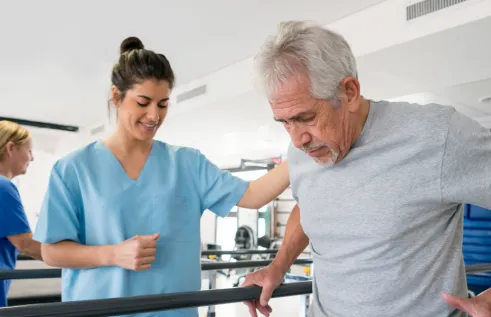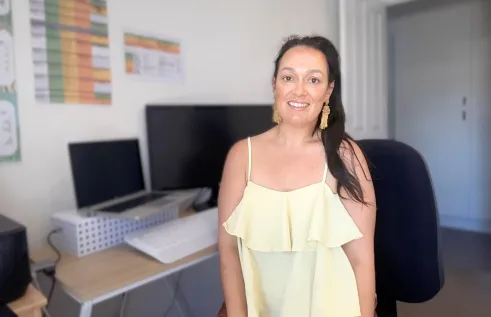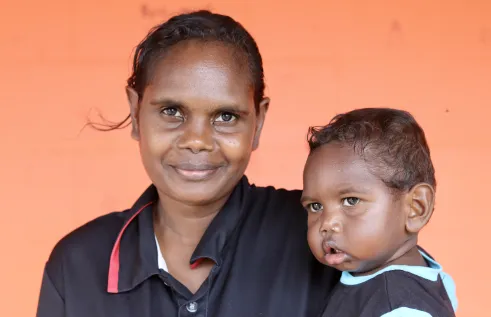Future study
What will a health science degree teach you?

If you’re hunting for a job, having a health science degree is a good thing. A very good thing, according to the Australian Government.
That’s because our ageing population, the NDIS (National Disability Insurance Scheme), and the concerning increase in chronic disease are driving jobs growth in the health care sector.
Health care is Australia's fastest growing industry
The Commonwealth Government’s Job Outlook website says that health care/social assistance will be the top industry for jobs growth over the next five years. That’s no surprise as it’s currently Australia’s largest and fastest growing industry, employing over 1.5 million people. It covers health services such as hospitals, GPs, health promotion and primary health, as well as services like child care and aged care.
With a goal to keep our populations healthy, the demand for health care increases, and so does the need for more professionals with a broad skill set. A health science degree from Charles Darwin University will give you those skills and helps fill the gap in the Australian health care system.
Bachelor of Health Science student Muriel says "I appreciate that the specialties offered are need-based around the NT, in attempts to fill these gaps in the health sector.” Read about her experience here.
What’s in a Bachelor of Health Science from CDU?
You’ll get the knowledge and skills you need to work in health promotion, Indigenous health, health services management, and more.
The course also has an emphasis on understanding the challenges of working in diverse contexts of urban, rural and remote communities and offers opportunity to study abroad with international study tours and student exchange programs available.
You’ll study alongside students from nursing, midwifery, social work and other allied health areas developing an understanding of the multidisciplinary professions across the health industry.
You’ll gain knowledge of health beyond illness and disease prevention and learn how to manage, coordinate and administer health infrastructure and resources.
There is a range of flexible delivery options for the course that include workshops, online, face-to-face and external learning platforms. You’ll have the option of choosing from streams in health promotion, health services management, occupational therapy or public health.
The course structure: from ethics to epidemiology
Here’s a small sampling of the topics you’ll cover in the course—topics that give you knowledge and skills that are in demand across the health industry:
- ethics in health care
- basics of epidemiology
- health promotion
- Indigenous health perspectives
- chronic conditions management
- evidence-based health research and practice
- social-cultural psychology
- working with and developing communities.
Searching for jobs
On the Seek jobs website, a search for ‘health science’ produces almost 5,000 results. Not all of those may be relevant to your job search, but many are.
Here’s a sampling of the jobs available to an entry-level employee who holds a degree in health science:
Mental Health Support Worker: assist clients to work towards person-centred goals, aiming to improve their capacity to live confidently and independently in their homes and communities, for a mental health charity.
Health and Wellbeing Manager: assisting in the development and delivery of face-to-face and online health and wellbeing programs, for a national organisation to integrate a culture of health and wellness.
Telehealth Coach: seeking a passionate allied health professional who has experience across multiple areas of chronic disease including diabetes and cardiovascular disease, who is passionate about changing the way healthcare is delivered, for a national charity organisation.
Associate Manager: if you have a health/science degree together with some work experience and are keen to start your medical device career this is your opportunity, for a medical device sales company.
Environmental Health Officer: focus on the Food Act and Public Health and Wellbeing inspection and complaints, for a Government service provider.
Leisure and Lifestyle Officer: planning and delivering meaningful leisure and lifestyle programs which enable the well-being of residents. You will work within a team to ensure that these programs promote optimal health, healthy ageing, and resident choice. You will have a strong customer service focus and tailor programs to meet individual resident needs.
A broad range of opportunities for grads
That’s a tiny sampling of career opportunities available to you if you hold a health sciences degree. Clearly, one of the best things about this degree is that more and more employers require it. And the opportunities for new graduates are extremely broad, from environmental science officers, to medical device salespeople, to medical research assistants.
This degree means you’ve got the job skills employers need to help fill the gap in the health care system, both nationally and internationally. Lastly, a Bachelor of Health Science can be an ideal platform to pursue postgraduate studies - think a Masters in Public Health or graduate entry into many allied health programs like occupational therapy or psychology.
Interested in CDU's Bachelor of Health Science? Explore the course structure, classes available, modes of study and entry requirements, or browse through our many allied health degrees.
Trying to find a course?
Related Articles

Filling the gap - Doctor of Pharmacy
Already in the health field and interested in expanding your skills and expertise? Our Doctor of Pharmacy degree is for you.
Read more about Filling the gap - Doctor of Pharmacy
From young mum to psychology graduate: Sherkeira’s decade-long journey with CDU
Read more about From young mum to psychology graduate: Sherkeira’s decade-long journey with CDUMeet Sherkeira, from Alice Springs in Australia's Red Centre – a First Nations mum with a remarkable story that proves that sometimes in life, the best things happen when things don’t go to plan.

How can we better support First Nations parents in remote communities?
Lexie Gregory's career has centred around supporting parents and families in remote communities, making Charles Darwin University the perfect place to start a Higher Degree by Research. She wants to ensure that parenting programs integrate First Nations worldviews into their design.
Read more about How can we better support First Nations parents in remote communities?

